(完整版)高考英语动词时态考点及练习题详解
2023-2024学年高考英语专项真题练习——动词的时态和语态(含解析)

2023-2024学年高考英语专项真题试卷练习——动词的时态和语态1.(湖南省炎德名校2023-2024学年高三试题)The sense of calm, well-being and pleasure that I feel when I’m hearing birdsong (support) by research.2.(湖南省炎德名校2023-2024学年高三试题)So, when you take a walk outdoors or go for a hike, (listen) for the birds that share your ce.3.(湖南省益阳市南县第一中学2023-2024学年高三试题)As we know, China’s Belt and Road Initiative______ (motivate) more countries to cooperate more closely so far.4.(湖南省永州一中2023-2024学年高三试题)Over the past few years, China (see) a risein young consumers interested in internal brands and products that incorporate traditional Chinese style and culture, a trend known as guochao.5.(湖南省岳阳市湘阴校联考2023-2024学年试题)Since the Chinese highly qualified silk (make) its fame to the western countries, the merchants sought the opportunity of trading Chinese silk along this route and gained a great fortune.6.(湖南省岳阳市湘阴校联考2023-2024学年试题)Many people took part and numerous goods (trade) in the great international trade at that time.7.(湖南省长沙麓山国际实验学校2023-2024学年高三试题)First manufactured in Shanghai in the 1940s, White Rabbit wasn’t only a household name in China, it also (use) as gifts for foreign dignitaries(政要).8.(湖南省长沙市第一中学2023-2024学年高三试题)China’s modernization process over the past four decades____ (create) a new context where there is a partnership between the ancient and modern, gnerating something new and genuine.9.(湖南省长沙市第一中学2023-2024学年高三试题)This new technology (be) as important then as the Internet is today for spreading of knowledge and communication.10.(湖南省长沙市南雅中学2023-2024学年高三试题)The neighborhood (change) over the decades, but the theater still stands tall and is currently managed by the National Peking Opera Company.11.(湖南师范大学附属中学2023-2024学年高三试题)To commemorate the occasion, China Post (issue)a collection of stamps in December(2021).12.(湖南师范大学附属中学2023-2024学年高三试题)During his lifetime, Wang (pen)more than 1, 000 poems.13.(湖南天壹名校联盟2023-2024学年高三大联考试题)The “Spring Fair”, featuring diverse Chinese cultural activities, (hold) on Sunday at the Garden of Serenity, a traditional Chinese garden in Santa Lucija, Malta.14.(湘豫名校联考2023-2024学年高三试题)It is a result of art and time. The tone of guqin is quiet and distant. The guqin (favor) by the literati(文人)in ancient China.15.(湘豫名校联考2023-2024学年高三试题)The earliest piece of guqin in China, unearthed in Hubei province in 2016, (date) back to the Zhou Dynasty. The body of a guqin is made of lacquered wood(漆木)and the strings of twisted silk.16.(湖南省常德市临澧一中2023-2024学年高三试题)Maliao village is famous for its silver jewellery. In fact, Miao silver jewellery (list) as National Intangible Cultural Heritage in 2006.17.(湖南省常德市临澧一中2023-2024学年高三试题)Since that year, most young craftsmen (return) to their hometown and found a bright future.18.(湖北省武汉市硚口区2023-2024学年高三质检)Tea picking (become) a habit for her over the past five years. After she is done, Tsering Yangdron goes back home, where she also runs a homestay.19.(湖北省武汉市硚口区2023-2024学年高三质检)“We have come up with a dish of fresh tea buds fried with eggs,” she said. A kilogram of fresh tea buds (sell) for 300 yuan.20.(湖北省孝感市重点高中协作体2023-2024学年高三试题)It represents the traditional cultural heritage of the Han ethnic group in China. Hanfu embodies the elegance, grace, and beauty of ancient Chinese civilization. In the last few years it (make) a comeback.21.(湖北省孝感市重点高中协作体2023-2024学年高三试题)Certain hanfu has a colorful reflective effect, as shiny decorative powders (stamp) into the cloth.22.(湖北省黄冈市2023-2024学年高三调研试题)Taiping Village, 40 kilometers north of Lingjiatan, has a volunteer team called “Taiping Women”, which (found) by Wang Zilian several years ago. 23.(湖北省宜荆荆恩2023-2024学年高三起点试题)Despite the word “snail” in its Chinese name, actual snails don’t commonly appear in the dish, but (use) to flavor the soup.24.(江苏省2023-2024学年高三名校联考检测试题)One day when she (cycle) to school, she bumps into a handsome student named Souta, who turns out to be a “Closer” — a person charged with “closing doors to another world”.25.(江苏省前黄高级中学2023-2024学年高三学情检测)The center (launch) in June on Zhenxing Road to help relieve the pressure on many of those running its 435 street stalls, many of whom are migrant workers from around the country without local relatives to help take care of their children. 26.(江苏省镇江第一中学2023-2024学年高三学情检测)According to a recent report archaeologists______ (restore) more than 140 Terracotta Warriors.27.(江苏省镇江市2023-2024学年高三试题)The story of the deep friendship between poet Gao Shi and the master of romantic poetry Li Bai (offer) a glimpse into the star-studded history of the Tang era.28.(2024届江苏省徐州市沛县高三模拟)Under the theme of “Chinese language plus arts”, the series______ (comprise) of two parts the first part of which contains four episodes, each featuring one artist.29.(2024届江苏省徐州市沛县高三模拟)In the first episode, Wu, one director of Fine Arts Experimental Art School at the academy (share) his creation procedure of The Heaven of Nine Levels, a hand-carved piece inspired by Shan Hai Jing.30.(江苏省百校联考2023-2024学年高三试题)Chen Bing is one of the inheritors (传承人) of the Chen-style taijiquan. He (practise) it since he was six years old under the guidance of his uncles, Chen Xiaowang and Chen Xiaoxing.31.(江苏省常熟市2023-2024学年高三10月抽测试题)It was a big day for Liu Jing, an overseas Chinese student in Paris. She (work) with her friends for three months on an exhibition.32.(江苏省常熟市2023-2024学年高三10月抽测试题)In mid 2022, the French brand Dior introduced its new collection by using China’s traditional mamianqun element without being acknowledged by relevant Chinese institutions. The French brand (criticize) due to the incident.33.(江苏省常州市八校2023年高三10月联合调研)He said he felt very good. He (follow) by Wang, the first female Chinese astronaut who had entered China’s ce station.34.(江苏省常州市八校2023年高三10月联合调研)“I want to tell my daughter, mom returned afterreaching for the stars,” she said. Ye (exit) last from the capsule.35.(江苏省常州市联盟校2023-2024学年高三10月调研试题)Altman said the technology could (use) for disinformation, emotional manipulation, or even “target drone strikes.”36.(江苏省常州市联盟校2023-2024学年高三10月调研试题)Lewina Lee, lead author of the study, said, “A lot of evidence ___ (suggest) that exceptional longevity( 长寿) is widely accompanied by a longer n of good health and living without disability.37.(江苏省常州市十校2023年高三联合调研)Any normal person sometimes experience disappointment, ambitions and the loss of loved ones. But for many people, these matters of human existence (transform) into an abnormal state of deir.38.(江苏省东台中学2023-2024学年高三10月试题)Despite the word “snail” in its Chinese name, actual snails don’t commonly appear in the dish, but (use) to flavor the soup.39.(江苏省灌南高级中学2023-2024学年高三试卷)Consequently, cybercrime coming in many different forms______ (become) a huge problem in recent years.40.(江苏省灌南高级中学2023-2024学年高三试卷)Cybercriminals took advantage of a weakness in a server,______ (assess) the company’s files and demanded a large sum of money.41.(江苏省连云港高级中学2023-2024学年高三试题)At the entrance to the villages, a grand “torch tower”, standing more than 20 metres high and made of pine branches and dry firewood, (decorate) with fresh flowers and fruits.42.(江苏省连云港外国语学校2023-2024学年高三试题)Carson proves that a simple literal form that has been passed down through the ages can still (employ) today to draw attention to important truths.43.(江苏省南京市五校2023年高三联考试题)“The on-loan program (highlight) close partnerships and scientific cooperation between China and other countries.44.(江苏省南京外国语学校2023-2024学年高三试题)Last November, traditional tea processing techniques and associated social practices in China (add) to the UNESCO Representative List ofthe Intangible Cultural Heritage of Humanity.45.(江苏省南京外国语学校2023-2024学年高三试题)“For centuries, the scent of tea leaves (offer) nutrition to this land. This intangible cultural heritage of tea processing techniques is deeply rootedin people’s everyday life.”46.(江苏省南通市如皋市2023-2024学年度高三调研试题)Wearing traditional Li costumes, and fishing in streams_____ (be) among visitors’ favorite activities. Danzhou has also attracted visitors by organizing sports events.47.(江苏省南通市如皋市2023-2024学年度高三调研试题)By Aug 19, Haihua Island (receive) over 1 million tourists during the summer vacation.48.(江苏省苏州中学校2023-2024学年高三试题) Besides their obvious monetary value, they all carry their own cultural value as well. For example, on the back of the 5-yuan banknote Taishan Mountain in Shandong.49.(2024届河北省百师联盟高三联考)He mentioned that the Chinese market is significant for jade products, and his business (operate) in China for 10 years.50.(河北省衡水市第二中学2023-2024学年高三检测试题)Among his impressive consideration_____ (be) Harvard, Stanford, and MIT.二单项选择1.I___________ for a lecture this afternoon, so I’m afraid I won’t be able to meet you at the airport.A.have prepared B.will have preparedC.have been preparing D.will be preparing2.In recent years, a global campaign ______ by the ce Agency to promote further development of the manned aviation.A.launched B.has launched C.was launched D.has been launched 3.—The works of art on show were beautiful indeed.—True. It’s a pity that we ________ to take photographs in the museum.A.didn’t allow B.hadn’t allowedC.weren’t allowed D.haven’t been allowed4.By the time my mother came back from work, my sister and I ______ supper and were waiting for her at the table.A.have cooked B.had cooked C.were cooking D.would cook5.The medical worker, along with his colleague, ________ thousands of citizens in the last three years.A.serves B.servedC.have served D.has served6.It’s reported that many houses________ at present in the disastrous area.A.have built B.are built C.are being built D.have been built7.Food supplies in this area________ out. We must act now before there is none left.A.are running B.will run C.have run D.run8.My father________ for ten years but he has given it up because of his illness.A.smokes B.smoked C.had smoked D.has smoked9.All passengers object to transferring to the next flight ________ they ________ a proper explanation.A.though; will make B.unless; are givenC.if; will give D.because; are made10.I ________ a new alarm clock the other day at Taylor’s when I heard someone singing a familiar song.A.bought B.was buying C.has bought D.would buy11.The boss finally decided to send Ken to Kunming for a business trip, for he ______ there for five years and is familiar with the city.A.works B.would work C.had worked D.has been working 12.Jenny, along with two boys in our school, ______ to London to attend an international meeting the other day.A.are invited B.is invited C.were invited D.was invited13.I’m well aware that I shouldn’t have got angry with John — He me; he really meant it for the best.A.hadn’t criticized B.wasn’t criticizingC.wouldn’t criticize D.hadn’t been criticizing14.Thompson has two plans, neither of ________ to be practical.A.them seem B.which seems C.which seeming D.that seem15.Today the number of people learning Kerean in China _________ increasing rapidly.A.were B.was C.are D.is16.My parents always remind us that by no means ________ no respect for our teachers.A.we show B.did we showC.should we show D.we should show17.—Bob has gone to Shanghai.—Oh, can you tell me when he_________?A.has left B.left C.is leaving D.would leaving 18.—Have you played the piano for a long time?—Yes, since I _________ the Aiqin Club.A.joined B.joins C.had joined D.has joined 19.—What’s the weather forecast for tomorrow?—Sorry, I was on the phone and ______ most of it.A.had missed B.missed C.would miss D.was missing 20.Increased light pollution globally means that the starry nights that once inspired artist such as Vincent van Gogh ________ much more difficult to observe over the past century.A.become B.have become C.became D.are becoming21.The number of people who own a car ______ in the past 10 years.A.increases B.has increased C.increased D.have increased22.Up to now large quantities of money ______________ to help those suffering from the floods.A.have collected B.has been collected C.have been collected D.will have collected 23.Not until I began to work did I realize how much time ______.A.had wasted B.had been wastedC.have wasted D.have been wasted24.Various measures ________ in the years ahead to boost the economic development A.are taken B.have been taken C.were taken D.will be taken25.Delete the short message at once! Many a man _________by such tricks up to now.A.are taken in B.is taken inC.have been taken in D.has been taken in26.In that accident his sight ______, but many people have given him a lot of help.A.had lost B.had missed C.was lost D.was missing27.She says that each of us has a role in making the earth a better place to live in.A.to have played B.to playC.to be played D.to be playing28.The teacher suggested that much attention should the spelling mistakes.A.pay for B.pay toC.be paid for D.be paid to29.—What do you think of his teaching method?—It should be popular; it _____ practical.A.proves B.is proved C.has been proved D.was proved30.They blamed the failure on George. Actually, he ________.A.is not to blame B.is to blame C.is not to be blamed D.should not blame三语篇填空Passage 1(2024届河北省廊坊市重点高中联考试题)阅读下面短文,在空白处填入1个适当的单词或括号内单词的正确形式。
2023年高考英语考前必练 谓语动词的时态语态(含近三年真题及解析)
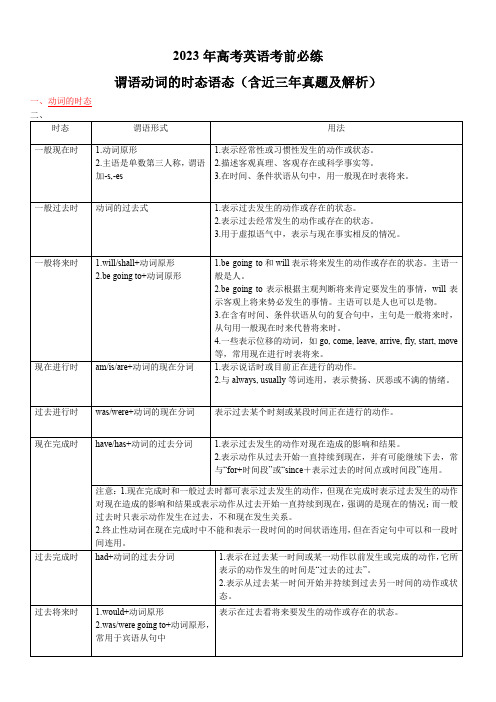
2023年高考英语考前必练谓语动词的时态语态(含近三年真题及解析)一、动词的时态特殊用法1.在时间、条件和让步状语从句中,如果主句谓语动词是一般将来时,从句用一般现在时。
如:We’ll have a picnic if it is fine next Sunday.如果下个星期日天气晴朗,我们将去野餐。
I’ll call you as soon as I get to Beijing tomorrow.我明天一到北京就给你打电话。
2.某些表示起始、往返、出发、到达之意的动词,可用一般现在时表示按规定、计划或安排将要发生的动作(此时一般都有一个表示未来时间的状语)。
这类动词有:begin, come, go, leave, start, arrive, end, stop, open, close等。
如:The meeting begins at 2:00 p.m. tomorrow.这个会议明天下午2点开始。
The next train leaves at 7 o’clock this evening.下一列火车将在今晚7点离开。
3.现在进行时与always, continually, forever等副词连用,表示反复出现或习惯性的动作,这种用法往往表达说话人的某种感情,如赞扬、遗憾、讨厌或不满等。
如:The rich woman is always laughing at the poor.这个有钱的夫人总是嘲笑穷人。
4.现在完成时中表示短暂动作的动词不能与for, since等引导的时间状语连用。
如与一段时间连用,要把瞬间动词转化为意思相近的延续性动词。
常见的变化有:特殊用法1.open,lock,write,read,sell,clean,wash,cut,drive等词作不及物动词时,它们的主语为物,可用主动语态表示被动意义。
如:This kind of pen writes very smoothly.这种钢笔写起来很流畅。
高中英语动词时态练习题及讲解
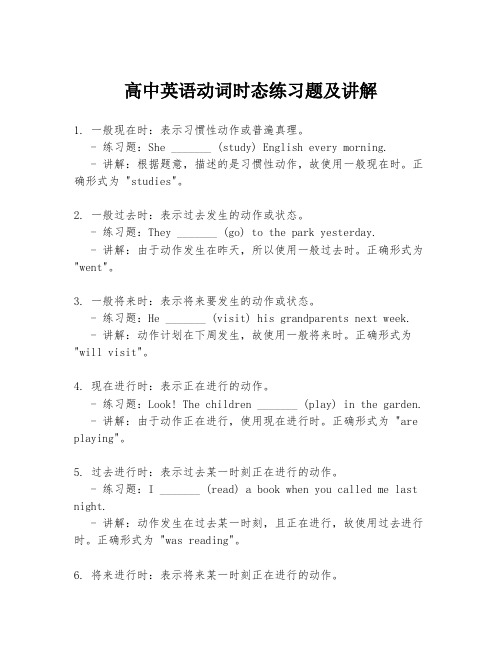
高中英语动词时态练习题及讲解1. 一般现在时:表示习惯性动作或普遍真理。
- 练习题:She _______ (study) English every morning.- 讲解:根据题意,描述的是习惯性动作,故使用一般现在时。
正确形式为 "studies"。
2. 一般过去时:表示过去发生的动作或状态。
- 练习题:They _______ (go) to the park yesterday.- 讲解:由于动作发生在昨天,所以使用一般过去时。
正确形式为"went"。
3. 一般将来时:表示将来要发生的动作或状态。
- 练习题:He _______ (visit) his grandparents next week. - 讲解:动作计划在下周发生,故使用一般将来时。
正确形式为"will visit"。
4. 现在进行时:表示正在进行的动作。
- 练习题:Look! The children _______ (play) in the garden. - 讲解:由于动作正在进行,使用现在进行时。
正确形式为 "are playing"。
5. 过去进行时:表示过去某一时刻正在进行的动作。
- 练习题:I _______ (read) a book when you called me last night.- 讲解:动作发生在过去某一时刻,且正在进行,故使用过去进行时。
正确形式为 "was reading"。
6. 将来进行时:表示将来某一时刻正在进行的动作。
- 练习题:She _______ (be) at a meeting at this time tomorrow.- 讲解:动作将在将来某一时刻进行,使用将来进行时。
正确形式为 "will be"。
7. 现在完成时:表示过去发生的动作对现在有影响或结果。
高考英语语法考点对比总结及练习(语法填空+短文改错)——动词类:时态与语态

●时态与语态语法填空考点目录(动词→谓语;同时考虑)1. 高考常考12种时态2. 时态与被动3. 时态与主谓一致高考常考12种时态(注:过去将来时:would do)1. 高考常考12种时态精选练习1. I ________ (be) ill. I’m staying in bed.2. It ________ (rain) when they left the station.3. Then he ________ (hide) behind a tree and waited.4. —Alvin, are you coming with us?—I’d love to, but something unexpected ________ (happen).5. We will start as soon as our team leader ________ (come).6. Unless extra money ________ (find), the theater will close.7. He’s always calm and never ________ (get) excited with her.8. And as soon as I put him up in the hotel, I ________ (drive) back.9. She ________ (phone) someone, so I nodded to her and went away.10. —Can I call you back at two o’clock this afternoon?—I’m sorry, but by then I ________ (fly) to Beijing. How about five?11. His first novel ________ (receive) good reviews since it came out last month.12. The three of us ________ (travel) around Europe for about a month last summer.13. That piece of music sounds quite familiar. Who ________ (play) the piano upstairs?14. Yes, his teacher says so. He ________ (work) hard at his lessons every evening for months. He wants to go to OxfordUniversity next year.15. I think Chinese people choose chopsticks, rather than knives and forks, because Chinese people, under the influence ofConfucianism, have traditionally ________ (consider) knives and forks as symbolizing a type of violence.1. The leaves ________ (turn) red.2. Don’t get off the bus until it ________ (stop).3. —Look! Somebody ________ (clean) the sofa.—Well, it wasn’t me. I didn’t do it.4. Three-fourths of the surface of the earth ________ (be) sea.5. I knew he could help me if he ________ (be) free the next day.6. On the next birthday, Ann ________ (be) married for twenty years.7. —I didn’t ask for the name list. Why has it ________ (land) on my desk?—I put it there just now in case you needed it.8. Look at the timetable. Hurry up! Flight 4025 ________ (take) off at 18:20.9. I found the lecture hard to follow because it ________ (start) when I arrived.10. After Jack had sent some e-mails, he ________ (start) working on his project.11. Did you predict that many students ________ (sign) up for the dance competition?12. By the time Jack returned home from England, his son ________ (graduate) from college.13. They made up their mind that they ________ (buy) a new house once Larry changed jobs.14. Shirley ________ a book about China last year but I don’t know whether she has finished it.15. Close the door of fear behind you, and you ________ (see) the door of faith open before you.16. In recent years, learning Chinese ________ (become) popular among people around the world.17. This is Ted’s photo. We miss him a lot. He ________ (kill) trying to save a child in the earthquake.18. Look at the pride on Tom’s face. He ________ (seem) to have been praised by the manager just now.19. Food supplies in the flood-stricken area ________ (run) out. We must act immediately before there’s none left.1. —What a mistake!—Yes. I ________ (suggest) his doing it another way, but without success.2. —You speak very good French!—Thanks. I ________ (study) French in Sichuan University for four years.3. When Alice came, she did not know how long she ________ (lie) there.4. Tom ________ (work) in the library every night over the last three months.5. The manager was concerned to hear that two of his trusted workers ________ (leave).2. 时态与被动精选练习1. The cloth ________ (wash) well.2. The door won’t ________ (open).3. Big dogs ________ (look) dangerous.4. Listen carefully when it ________ (begin).5. In the last few years thousands of films ________ (produce) all over the world.6. And action movies like that need to be ________ (see) in a theatre on a big screen.7. Controls should ________ (place) on these pesticides until bee safety can be guaranteed.8. In the near future, more advances in the robot technology ________ (make) by scientists.9. After getting lost in a storm, a member of the navy team ________ (rescue) four days later.1. Is honesty the best policy? We ________ (teach) that it is when we are little.2. They are living with their parents for the moment because their own house ________ (rebuild).3. Just as she sat down, the telephone rang. It was from her neighbor, “My cat ________ (kill) by a car.”4. During the Spring Festival in China, children ________ (give) money in a red envelope to bring good fortune in theNew Year.3. 时态与主谓一致精选练习1. What we need badly now ________ (be) doctors.2. Three-fourths of the surface of the earth ________ (be) sea.3. —Did you go to the show last night?—Yeah. Every boy and girl in the area ________ (be) invited.4. I heard that Reading Skills ________ (be) newly published in America.5. A library with five thousand books ________ (offer) to the nation as a gift.6. They believe we are the suitable men who ________ (be) going to defeat the enemies.7. Either you or one of your students ________ (be) to attend the meeting that is due tomorrow.8. With forests being destroyed, huge quantities of good earth ________ (wash) away each year.9. Not only I but also Jane and Mary ________ (be) tired of having one examination after another.10. As a result of destroying the forests, a large quantity of desert ________ (be) covered the land.11. Listening to loud music at rock concerts ________ (have) caused hearing loss in some teenagers.12. A poet and artist ________ (be) coming to speak to us about Chinese literature and painting this afternoon.短文改错考点目录1. 时态一致2. 主谓一致3. 被动语态4. 主系表1. 时态一致明:(1)现在⇌过去(2)have/has/had+-ed →-ed(3)have/has/had+did →have/has/had+done暗:-ed →have/has/had+-ed精选练习1. Today it is much easier to be healthy than it is in the past.2. It is three years now since I graduate from Xinhua High School.3. My grandfather graduates from Harvard University 35 years ago.4. I asked him why and he told me that the battery has died, so he threw it away.5. When it is time for us to say goodbye, she wrote on my hand: “Please come here as often as possible.”6. When I tear apart my fifth birthday toy train, my father said, “That’s it. No more toys for you.”1. I will write again and send you the photos we take together.2. Hello I learn about you from my English teacher, Miss Fang.3. By the end of last year, my collection has grown to 3000 words.4. I use to play ping-pong a lot in my spare time, but now I am interested in football.5. A child knows quite well that littering was wrong, why can’t an adult realize this?6. Kids who used a wheelchair or have lots of health problems want friends just like you do.7. I am very pleased to say that all of us greatly improved our spoken English so far.8. I was taking a train to London’s Victoria Station. I had noticed that the carriage was noisy and filled with people.9. After having a short rest there and sharing the food we had brought, we started going down. It had rained even harder.10. Then he said something surprising. He said, “This has been so nice. Thank you. I hadn’t really talked to anybody in along time.”11. I had asked my roommate to meet you at the airport and you can stay in my room. He’s a very nice person and he’ll show you around the city.12. Her classes are so full of fun that you will never feel bored. To improve our grades, she usually gave us some advice on how to learn English well.13. When I was seven years old, my family grew out first square watermelon. No one has ever seen a square watermelon before, so it became famous instantly.14. On the box was card saying: “25 cents each.” “You will never sell these much,” he told Nick. Convinced, Nick has brought the price down to 10 cents a piece.15. The first man got over his shock and politely said to the angel, “I’ve suffered from back pain for years. Can you help me?” The angel touched his back, and he had recovered.2. 主谓一致明:语法一致、意义一致和就近原则暗:常规考查精选练习1. But not all information are good to society.2. —Did you go to the show last night?—Yeah. Every boy and girl in the area were invited.3. Now my picture and the prize is hanging in the library.4. Katia, like many other Russian girls, are nice and lively.5. Starting your collection of stamps are easy because they are everywhere.6. After hearing your sad stories, he will say some words that is nice and warm.7. One evening she told me that something happened when her parents was out.8. It is reported that many a new house are being built at present in the disaster area.9. In January this year, the rate of the UFO reports were steady, around three per week.10. One-third of the country is covered with trees and the majority of the citizens is black people.11. I think science classes clear up my mysteries. But then there is always more mysteries to look into.12. There are branch libraries in many villages. Anyone may borrow books, and it cost nothing to borrow them.13. But once you’ve started collecting seriously, you will probably want to join the Stamp Collectors’ Club which exist toadd more stamps to you collection.1. The pay were 10 cents per envelope.2. What may surprise you are that I’m going to the US this July in a summer camp!3. Luckily I had all my money in my pocket, but the only clothes I had was those I had on.4. For example, Shanghai food, a little bit sweet, differ from Sichuan food that is rather hot.5. Every possible means have been used to prevent the air pollution, but the is still not clear.6. A poet and artist are coming to speak to us about Chinese literature and painting this afternoon.7. Goodnight and remember, you, dear diary, is my only souvenir from my best life and my only friend.8. Playing football not only makes us grow up tall and strong but also give a sense of fair play and team spirit.9. All of us need friendship. The understanding between two friends mean both of them have similar ideas and trust eachother.3. 被动语态明:(1)be+-ed →-ed(2)be+V任何→be+done暗:-ed →be+-ed精选练习1. Books may be keep for four weeks2. When one student does so, much larger values are destroying.3. Today, I got a letter that said I had been admitting to a college. I am proud of it.4. After the drive, it was cost just over £2 to put the car back into perfect condition.1. Tea in China was traditionally drank from cups without handles.2. One day the school held a party, where I invited to talk about Tianjin.3. It was turned to be her own cup, which she’d left on the shelf by mistake.4. Suddenly the arrows were flying down at us from the sky—they were looked like rain!5. We hung a sign on the front door that was read: “We’re having dinner. Come back later.”6. I’m glad that you’ve been settled down in Boston and are getting used to the local way of life.7. If I have the honor to be chose to work for the 29th, Olympic Games, I will first improve my English so that I can talkeasily with foreign visitors.8. If you pay the cost of sending a postcard, the librarian will write to you, and let you know when the book you want hasreturned and is ready for you to pick up.9. As is planning, I’m coming to Boston around the 15th, and I wonder if you’ll be free then so we could chat about thegood old days.4. 主系表暗:(1)主+adj. →主+be+adj.(2)句子缺谓语精选练习1. What your favorite sport?2. They eager to know everything about China and asked me lots of questions.3. The commanding officer, Wayne Tyler, who directly responsible for the study of all such reports, decided to make hisfindings known.However, every kind of Chinese food is worth trying, because each has a delicious taste and good for health.参考答案●时态与语态语法填空1. 高考常考12种时态精选练习1. is2. was raining3. hid4. has happened5. comes6. is found7. gets8. will drive9. was phoning10. am flying11. has received12. traveled13. is playing14. has been working15. considered1. are turning2. stops, has stopped3. has cleaned4. is5. was6. has been7. landed8. takes9. had started10. started11. would sign12. had graduated 13. would buy14. was writing15. will see16. is becoming17. was killed18. seems19. are running1. had suggested2. studied, have studied3. had lain4. has been working5. were leaving2. 时态与被动精选练习1. washes2. open3. look4. begins5. have been produced6. seen7. be placed8. will be made9. was rescued1. are taught2. is being rebuilt3. was killed4. are given3. 时态与主谓一致精选练习1. are2. is3. was4. was5. is offered6. are7. is8. are being washed9. are10. is11. has12. is短文改错1. 时态一致精选练习1. 第2个is→was2. graduate→graduated3. graduates→graduated4. has→had5. is→was6. tear→tore1. take→took2. learn→leant3. has→had4. use→used5. was→is6. used→use7. greatly→have greatly8. 去掉had9. 去掉第二个had10. hadn’t→haven’t11. had→have12. gave→gives 13. has→had14. has→had15. 去掉最后的had2. 主谓一致精选练习1. are→is2. were→was3. is→are4. are→is5. are→is6. is→are7. was→were8. are→is9. were→was10. 第二个is→are11. is→are12. cost→costs 13. exist→exists1. were→was2. are→is3. was→were4. differ→differs5. have→has6. are→is7. is→are8. give→gives9. mean→means3. 被动语态精选练习1. keep→kept2. destroying→destroyed3. admitting→admitted4. 去掉was1. drank→drunk2. invited→was invited3. 去掉was4. 去掉第二个were115. 去掉was 6. 去掉been7. chose →chosen 8. returned →been returned 9. planning →planned4. 主系表精选练习1. What 后加is2. They 后加were3. who 后加wasgood 前加is。
动词的时态和语态-2025年高考英语一轮复习参考答案

动词的时态和语态时态:时态主动被动一般现在时do/does; am/is/are am/is/are done一般过去时did; was/were was/were done 一般将来时will/shall do will/shall be done过去将来时would/should dowas/were going to dowas/were(about)to dowould/should be donewas/were going to be donewas/were(about)to be done现在进行时am/is/are doing am/is/are being done过去进行时was/were doing was/were be ing done将来进行时will/shall be doing现在完成时have/has done have/has been done过去完成时had done had been done将来完成时will have done will have been done2.必备知识考点一一般时知识点1一般现在时1.表示经常性的动作,常与usually,always,often,sometimes,never,every day等表示频度的时间状语连用。
2.表示客观真理、格言或者警句等。
3.表示按规定、时间表、计划或安排要发生的动作。
动词come, go, arrive, leave, start, begin, return, live, fly等,常用一般现在时表示将来发生的动作。
4.在时间、条件等状语从句中常用一般现在时代替一般将来时。
5.以here/there开头引导的倒装句,表示正在发生的动作/状态6.用于文章标题、图片说明、电影说明、戏剧内容及场景解说等。
知识点2一般过去时1. 表示在过去发生的一次性动作或习惯性动作或存在的状态,常用yesterday,last year,in 1995,the other day等作时间状语。
英语时态练习50题及答案解析精选全文

英语时态练习题及答案解析1.His parents often_____him at home alone watching TV.A.leftB.leavesC.leaveD.leaf答案:C解析:译文:他的父母经常把他单独留在家看电视。
本题考查时态。
根据句意可知,表示经常性的动作,用一般现在时,主语为his parents,是复数,谓语动词用原形。
因此选C。
2.These policemen often_____the children go across the street.A.helpB.helpsC.helpingD.is helping答案:A解析:译文:这些警察经常帮助孩子们过马路。
本题考查时态。
根据句意可知表示经常性的动作,用一般现在时,主语为the policemen,是复数,谓语动词用原形。
因此选A。
3.Jack_____in a bank.He went to the bank after graduation and he has never changed his job.A.worksB.workedC.will workD.had worked答案:A解析:译文:Jack在一家银行工作,他毕业后就去银行了,还没有换过工作。
本题考查时态。
根据句意可知,第一句话只是描述Jack的常态,描述一件常态的事情,用一般现在时,故选A。
4.No sooner_____from the airport than we were starting to land.A.we had taken offB.we took offC.have we taken offD.had we taken答案:D解析:译文:我们才从机场起飞就要着陆了。
本题考查时态。
No sooner…than…表“一…就…”,前半句要用过去完成时,排除B、C;且No sooner位于句首时,句子要部分倒装,需要把had提到主语前面,排除A。
高考英语语法动词的时态和语态高考真题解析
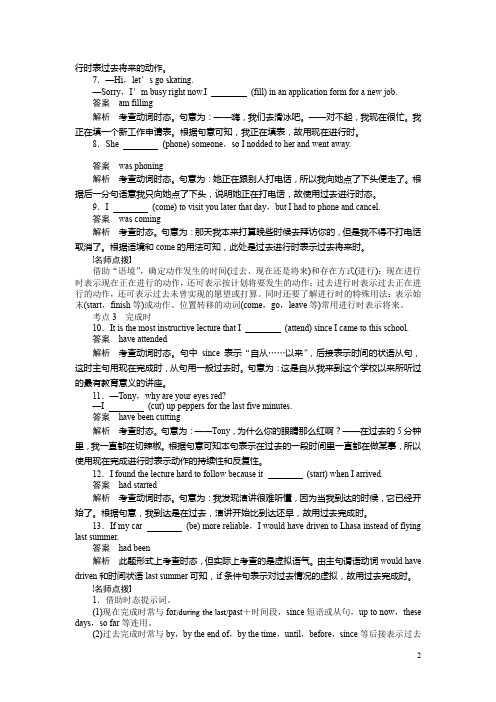
新课标高考英语语法动词的时态和语态高考真题例析动词的时态和语态考点1一般时1.On Monday mornings it usually (take) me an hour to drive to work although the actual distance is only 20 miles.答案takes解析句意为:通常在周一早上我要开一个小时的车去上班,尽管实际上只有二十英里的路程。
由usually以及从句时态,可知应用一般现在时。
2.I’m calling about the apartment you (advertise) the other day.Could you tell me more about it?答案advertised解析考查时态。
第一句句意为:我打电话咨询你昨天登广告的那所公寓。
根据the other day可知,该空处为一般过去时态。
3.—What time is it?—I have no idea.But just a minute,I (check) it for you.答案will check解析考查动词时态。
句意为:——什么时间了?——我不知道。
等一会儿,我给你查查。
根据句意以及just a minute可知,动作check发生于将来,故用一般将来时。
4.You’d better write down her phone number before you (forget) it.答案forget解析考查时态。
句意为:趁着还没忘记,你最好把她的电话号码写下来。
before引导一个表示“将来”的时间状语从句,在时间状语从句中用一般现在时代替将来时。
5.—Haven’t seen you for ages!Where have you been?—I went to Ningxia and (stay) there for one year,teaching as a volunteer.答案stayed解析考查时态。
高考时态真题87道(带详细讲解)
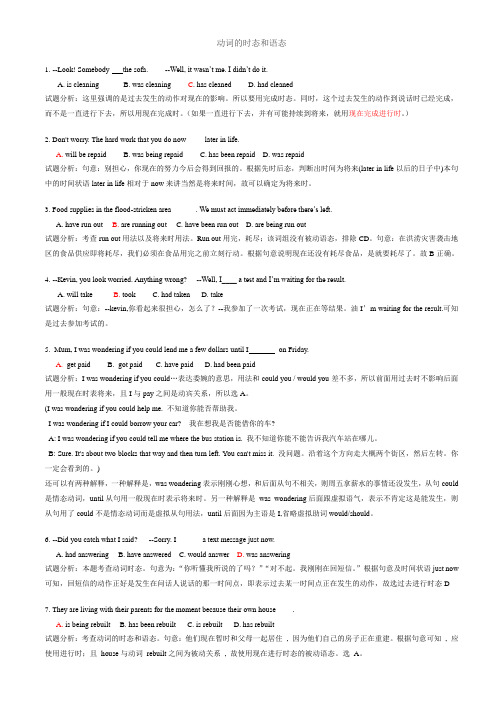
动词的时态和语态1. --Look! Somebody the sofa. --Well, it wasn’t me. I didn’t do it.A. is cleaningB. was cleaningC. has cleanedD. had cleaned试题分析:这里强调的是过去发生的动作对现在的影响。
所以要用完成时态。
同时,这个过去发生的动作到说话时已经完成,而不是一直进行下去,所以用现在完成时。
(如果一直进行下去,并有可能持续到将来,就用现在完成进行时。
)2. Don't worry. The hard work that you do now ____ later in life.A. will be repaidB. was being repaidC. has been repaidD. was repaid试题分析:句意:别担心,你现在的努力今后会得到回报的。
根据先时后态,判断出时间为将来(later in life以后的日子中)本句中的时间状语later in life相对于now来讲当然是将来时间,故可以确定为将来时。
3. Food supplies in the flood-stricken area ______. We must act immediately before there’s left.A. have run outB. are running outC. have been run outD. are being run out试题分析:考查run out用法以及将来时用法。
Run out用完,耗尽;该词组没有被动语态,排除CD。
句意:在洪涝灾害袭击地区的食品供应即将耗尽,我们必须在食品用完之前立刻行动。
根据句意说明现在还没有耗尽食品,是就要耗尽了。
故B正确。
4. --Kevin, you look worried. Anything wrong? --Well, I____ a test and I’m waiting for the result.A. will takeB. tookC. had takenD. take试题分析:句意:--kevin,你看起来很担心,怎么了?--我参加了一次考试,现在正在等结果。
(完整版)高中英语时态综合练习,附答案

专业课原理概述部分一、选择题(每题1分,共5分)1.下列哪个时态表示过去某个特定时间发生的动作?A. Simple PresentB. Simple PastC. Simple FutureD. Present Continuous2.现在进行时态的构成是?A. 动词原形 + ingB. 动词过去式 + ingC. 动词原形D. will + 动词原形3.下列哪个句子使用了正确的过去进行时态?A. She was watched TV all evening.B. He was played football yesterday.C. They was eating dinner when I called.D. I was reading a book at 8 PM yesterday.4.将来完成时态的构成是?A. will have + 过去分词B. will + 动词原形C. would have + 过去分词D. is going to + 动词原形5.下列哪个时态表示将来某个时间开始,并可能继续下去的动作?A. Simple FutureB. Future ContinuousC. Future PerfectD. Present Continuous二、判断题(每题1分,共5分)1.现在进行时态不能用于描述正在进行的动作。
()2.过去进行时态的构成是was/were + 动词原形。
()3.将来完成时态可以用来表示在将来某个时间之前已经完成的动作。
()4.现在完成时态的构成是have/has + 过去分词。
()5.过去完成时态的构成是had + 过去分词。
()三、填空题(每题1分,共5分)1.我昨天晚上_____(read)了一本好书。
2.他们_____(go)去公园散步了。
3.当她到达学校时,雨_____(stop)了。
4.到明年这个时候,我_____(graduate)已经三年了。
高考英语语法之常用时态知识点讲义

高中英语语法之常用时态知识点和练习题英语六种常用时态知识点一、一般现在时 (be;do/does)1.概念:表示现在发生的动作、情况、状态和特征。
经常性、习惯性动作。
标志词:often, sometimes, usually, always, occasionally 等和时间状语如 in the evening, at night, twice a month, on Sundays, every day/week/month/year,等。
用法:(1).客观事实和普遍真理。
The earth runs around the sun.(2)表示一个按规定、计划或安排要发生的动作,(仅限于某些表示“来、去、动、停、开始、结束、继续”等的动词)可以与表示未来时间的状语搭配使用。
常见的用法是:飞机、火车、轮船、汽车等定期定点运行的交通方式。
The next train leaves at 3 o'clock this afternoon.下一趟火车今天下午3点开车。
How often does this shuttle bus run?这班车多久一趟?(3)在由 when, after, before, until, till, as soon as,等引导的时间状语从句或由if, so/as long as, once, even if, although, whether…or…, in case, whatever, whenever, wherever 等引导的条件状语从句中,通常用一般现在时代替一般将来时(主将从现)。
When you have finished the report, I will have waited for about 3 hours.等你完成这份报告的时候,我就已经等了将近3个小时了。
二、一般过去时1.概念:表示过去某个时间发生的动作或情况。
2.标志词:yesterday, last year, last night, the other day, just now, then, two days ago, in , at that time等。
新高考英语真题分项汇编专题:动词的时态、语态和主谓一致(解析版)

专题06动词的时态、语态和主谓一致1.(2023年新高考II卷)As a little girl,I________(wish)to be a zookeeper when I grew up.【答案】wished【详解】考查动词时态。
句意:作为一个小女孩,我希望长大后成为一名动物园管理员。
分析句子结构可知,本句缺少谓语动词,所以wish作本句谓语,和主语I之间是主动关系,根据后文的grew可知用一般过去时。
故填wished。
2.(2023年浙江卷1月)Citizens of higher social classes(permit)to live closer to the center of the circles.【答案】were permitted【详解】考查动词的被动语态。
句意:高等阶层的公民被允许住在离中心地带更近的地方。
分析句子结构可知,空格处在句中作谓语,和主语Citizens of higher social classes构成被动关系,因为是对过去事实的陈述应用一般过去时。
故填were permitted。
3.(2023年浙江卷1月)The large siheyuan of these high-ranking officials and wealthy businessmen often______ (feature)beautifully carved and painted roof beams and pillars(柱子).【答案】featured【详解】考查动词时态。
句意:这些高级官员和有钱商人的高大的四合院,通常以雕刻精美和被粉刷的房顶横梁和柱子为特点。
分析句子结构可知,空格处需要填谓语动词,再结合上下文时态可知,空格处应用一般过去时。
故填featured。
1.(2022年全国高考新高考I卷语法填空)The plan will extend protection to a significant number of areas that ________(be)previously unprotected,bringing many of the existing protected areas for giant pandas under one authority to increase effectiveness and reduce inconsistencies in management.【答案】were【详解】考查时态和主谓一致。
高考英语现在进行时试题(有答案和解析)及解析
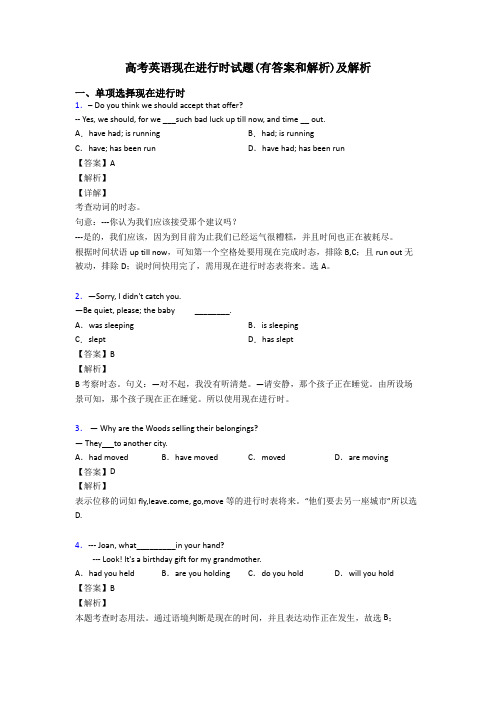
高考英语现在进行时试题(有答案和解析)及解析一、单项选择现在进行时1.– Do you think we should accept that offer?-- Yes, we should, for we ___such bad luck up till now, and time __ out.A.have had; is running B.had; is runningC.have; has been run D.have had; has been run【答案】A【解析】【详解】考查动词的时态。
句意:---你认为我们应该接受那个建议吗?---是的,我们应该,因为到目前为止我们已经运气很糟糕,并且时间也正在被耗尽。
根据时间状语up till now,可知第一个空格处要用现在完成时态,排除B,C;且run out无被动,排除D;说时间快用完了,需用现在进行时态表将来。
选A。
2.—Sorry, I didn't catch you.—Be quiet, please; the baby ________.A.was sleeping B.is sleepingC.slept D.has slept【答案】B【解析】B 考察时态。
句义:—对不起,我没有听清楚。
—请安静,那个孩子正在睡觉。
由所设场景可知,那个孩子现在正在睡觉。
所以使用现在进行时。
3.— Why are the Woods selling their belongings?— They to another city.A.had moved B.have moved C.moved D.are moving【答案】D【解析】表示位移的词如fly,e, go,move等的进行时表将来。
“他们要去另一座城市”所以选D.4.--- Joan, what_________in your hand?--- Look! It's a birthday gift for my grandmother.A.had you held B.are you holding C.do you hold D.will you hold【答案】B【解析】本题考查时态用法。
高考英语动词时态和语态(真题——精讲)
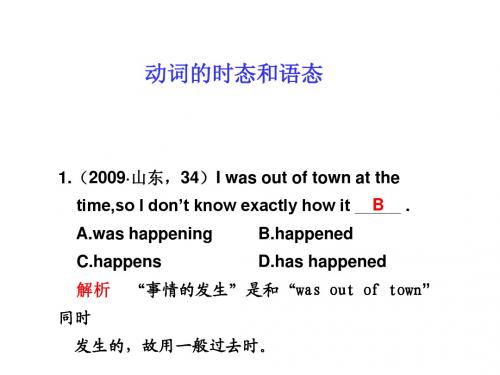
9.(2009· 江西,29)— What is the price of petrol these days? — Oh,it B sharply since last month. B.has risen D.is increased A.is raised C.has arisen
解析
3. 现在进行时 表示此时此刻或现阶段正在进行的动作,具有暂 时性、持续性、未完成性的特点。具体表示:
(1)表示说话时刻正在发生或进行着的动作。
(2)表示现在阶段正在进行的动作。 4. 现在完成时
现在完成时是过去的动作或状态对现在的影响或
对现在造成的结果,以及表示从过去开始的动作或 状态一直持续到现在。注意以下几点:
又因他的妹妹和hear of之间是被动关系,故排除
D项。
3. (2009· 江苏,21)The population of Jiangsu A to more than twice what it was in B.have grown D.are growing 1949.The figure is now approaching 74 million. A.has grown C.grew
15.(2009· 福建,31) According to the literary
review,Shakespeare
D
his characters
live through their language in his plays.
A.will make
C.was making
B.had made
(3)be to do sth.表示按计划、安排即将发生的
动作或表示吩咐、命令、禁止等。 (4)be about to do sth.表示“即刻,就要”, 后面不能接表示将来的时间状语。
高中英语必修课----复习动词时态知识讲解及巩固练习题(含答案解析)
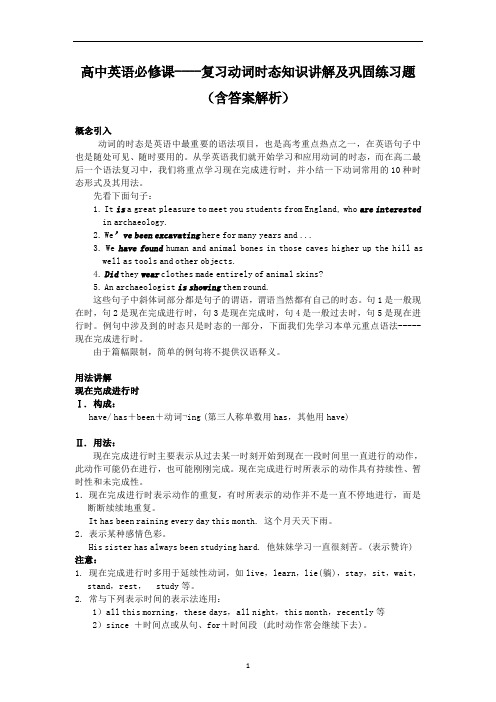
高中英语必修课----复习动词时态知识讲解及巩固练习题(含答案解析)概念引入动词的时态是英语中最重要的语法项目,也是高考重点热点之一,在英语句子中也是随处可见、随时要用的。
从学英语我们就开始学习和应用动词的时态,而在高二最后一个语法复习中,我们将重点学习现在完成进行时,并小结一下动词常用的10种时态形式及其用法。
先看下面句子:1.It is a great pleasure to meet you students from England,who are interestedin archaeology.2.We’ve been excavating here for many years and...3.We have found human and animal bones in those caves higher up the hill aswell as tools and other objects.4.Did they wear clothes made entirely of animal skins?5.An archaeologist is showing them round.这些句子中斜体词部分都是句子的谓语,谓语当然都有自己的时态。
句1是一般现在时,句2是现在完成进行时,句3是现在完成时,句4是一般过去时,句5是现在进行时。
例句中涉及到的时态只是时态的一部分,下面我们先学习本单元重点语法-----现在完成进行时。
由于篇幅限制,简单的例句将不提供汉语释义。
用法讲解现在完成进行时Ⅰ.构成:have/has+been+动词¬ing(第三人称单数用has,其他用have)Ⅱ.用法:现在完成进行时主要表示从过去某一时刻开始到现在一段时间里一直进行的动作,此动作可能仍在进行,也可能刚刚完成。
现在完成进行时所表示的动作具有持续性、暂时性和未完成性。
1.现在完成进行时表示动作的重复,有时所表示的动作并不是一直不停地进行,而是断断续续地重复。
高考英语专项复习《动词的时态、语态、情态动词、虚拟语气》真题总结含答案
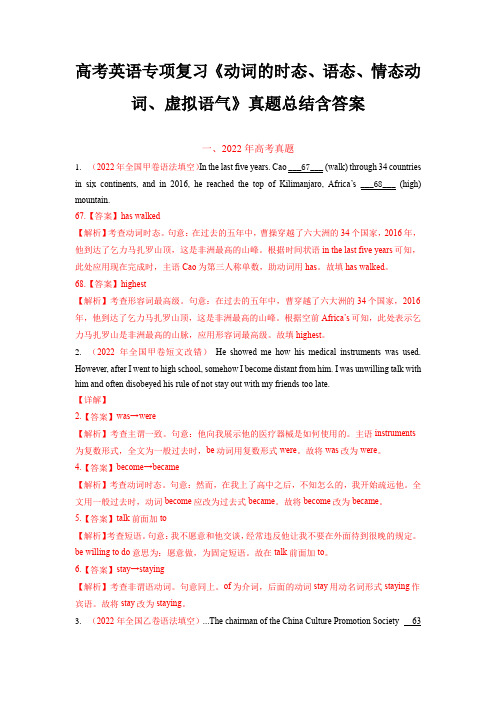
高考英语专项复习《动词的时态、语态、情态动词、虚拟语气》真题总结含答案一、2022年高考真题1.(2022年全国甲卷语法填空)In the last five years. Cao ___67___ (walk) through 34 countries in six continents, and in 2016, he reached the top of Kilimanjaro, Africa’s ___68___(high) mountain.67.【答案】has walked【解析】考查动词时态。
句意:在过去的五年中,曹操穿越了六大洲的34个国家,2016年,他到达了乞力马扎罗山顶,这是非洲最高的山峰。
根据时间状语in the last five years可知,此处应用现在完成时,主语Cao为第三人称单数,助动词用has。
故填has walked。
68.【答案】highest【解析】考查形容词最高级。
句意:在过去的五年中,曹穿越了六大洲的34个国家,2016年,他到达了乞力马扎罗山顶,这是非洲最高的山峰。
根据空前Africa’s可知,此处表示乞力马扎罗山是非洲最高的山脉,应用形容词最高级。
故填highest。
2.(2022年全国甲卷短文改错)He showed me how his medical instruments was used. However, after I went to high school, somehow I become distant from him. I was unwilling talk with him and often disobeyed his rule of not stay out with my friends too late.【详解】2.【答案】was→were【解析】考查主谓一致。
句意:他向我展示他的医疗器械是如何使用的。
主语instruments 为复数形式,全文为一般过去时,be动词用复数形式were。
高考英语一般过去时用法总结(完整)

高考英语一般过去时用法总结(完整)一、单项选择一般过去时1.My son turned to bookstores and libraries seeking information about the book recommended by his professor, but n one.A.would find B.had foundC.found D.has been finding【答案】C【解析】【详解】考查时态。
句意:我儿子到书店和图书馆去找教授推荐的那本书的资料,但一无所获。
此处表示并列,此空与turned 表示并列关系,所以用一般过去时态,故选C。
2.This summer holiday, many foreign students to China for a holiday.A.come B.have comeC.had come D.came【答案】D【解析】考查动词时态。
句意:今年夏天,许多外国学生来中国度暑假。
表示过去时间发生的事,此处是陈述事实,用一般过去时。
故选D。
3.Mary cleverly me t the customer ’ s requirements that you __ to deal with, so shewon the competition.A.failed B .failC.may fail D.must fail【答案】A【解析】考查动词时态。
句意:玛丽巧妙地满足了你没能应付的客户的要求,所以她赢得了比赛。
根据句意可知句子用一般过去时态,故答案为A。
4.—Where was I?—You _______ you didn e’ yotulirkjob.A.had said B.saidC.were saying D.has said【答案】B【解析】考查动词的时态。
句意:——我说到哪里?——你说到你不喜欢你的工作。
结合语境可知,下文描述的是过去的刚刚发生的动作,故用过去时态。
高考英语状语从句和动词时态详解及练习
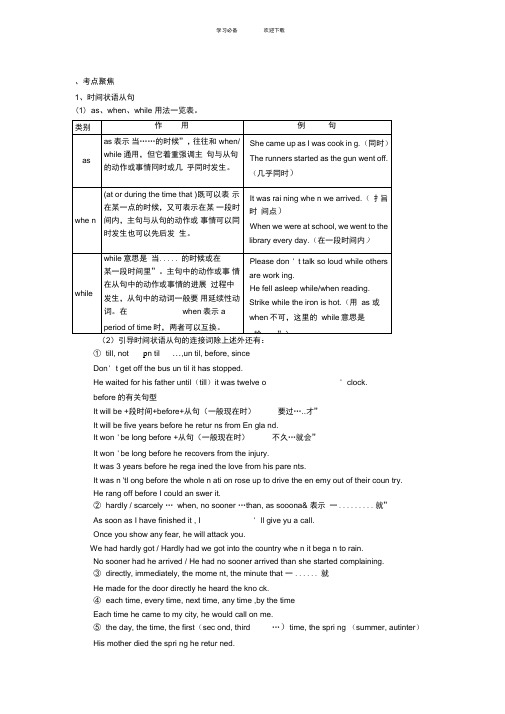
、考点聚焦1、时间状语从句(1) as、when、while 用法一览表。
(2)引导时间状语从句的连接词除上述外还有:①till, not p n til …,un til, before, sinceDon' t get off the bus un til it has stopped.He waited for his father until(till)it was twelve o ' clock.before的有关句型It will be +段时间+before+从句(一般现在时)要过…..才”It will be five years before he retur ns from En gla nd.It won 'be long before +从句(一般现在时)不久…就会”It won 'be long before he recovers from the injury.It was 3 years before he rega ined the love from his pare nts.It was n 'tl ong before the whole n ati on rose up to drive the en emy out of their coun try.He rang off before I could an swer it.②hardly / scarcely … when, no sooner …than, as sooona& 表示一......... 就”As soon as I have finished it , I ' ll give yu a call.Once you show any fear, he will attack you.We had hardly got / Hardly had we got into the country whe n it bega n to rain.No sooner had he arrived / He had no sooner arrived than she started complaining.③directly, immediately, the mome nt, the minute that 一...... 就He made for the door directly he heard the kno ck.④each time, every time, next time, any time ,by the timeEach time he came to my city, he would call on me.⑤the day, the time, the first(sec ond, third …)time, the spri ng (summer, autinter)His mother died the spri ng he retur ned.注意:表示未来情况,主句用将来时,从句用现在时。
2024年高考真题和模拟题英语分类汇编:专题02 动词的时态、语态、情态动词、虚拟语气(解析版)
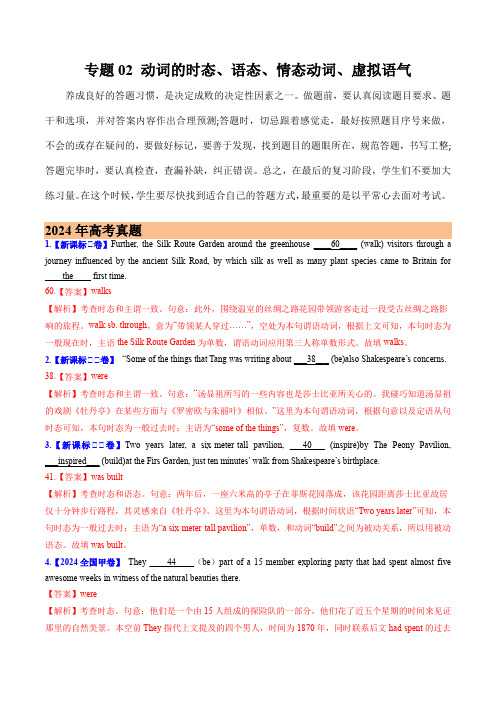
专题02 动词的时态、语态、情态动词、虚拟语气养成良好的答题习惯,是决定成败的决定性因素之一。
做题前,要认真阅读题目要求、题干和选项,并对答案内容作出合理预测;答题时,切忌跟着感觉走,最好按照题目序号来做,不会的或存在疑问的,要做好标记,要善于发现,找到题目的题眼所在,规范答题,书写工整;答题完毕时,要认真检查,查漏补缺,纠正错误。
总之,在最后的复习阶段,学生们不要加大练习量。
在这个时候,学生要尽快找到适合自己的答题方式,最重要的是以平常心去面对考试。
2024年高考真题1.【新课标Ⅰ卷】Further, the Silk Route Garden around the greenhouse ____60____ (walk) visitors through a journey influenced by the ancient Silk Road, by which silk as well as many plant species came to Britain for ____the____ first time.60.【答案】walks【解析】考查时态和主谓一致。
句意:此外,围绕温室的丝绸之路花园带领游客走过一段受古丝绸之路影响的旅程。
walk sb. through,意为“带领某人穿过……”,空处为本句谓语动词,根据上文可知,本句时态为一般现在时,主语the Silk Route Garden为单数,谓语动词应用第三人称单数形式。
故填walks。
2.【新课标ⅠⅠ卷】“Some of the things that Tang was writing about ___38___ (be)also Shakespeare’s concerns.38.【答案】were【解析】考查时态和主谓一致。
句意:“汤显祖所写的一些内容也是莎士比亚所关心的。
我碰巧知道汤显祖的戏剧《牡丹亭》在某些方面与《罗密欧与朱丽叶》相似。
2022年高考英语真题分类汇编 专题02 动词的时态和语态及情态动词(解析版)

2022年高考试题及模拟题分项解析之专题2动词的时态和语态及情态动词1.【2022·北京】21.Jack ________ in the lab when the power cut occurred.A. worksB. has workedC. was workingD. would work【答案】C考点:考查时态【名师点睛】一、过去进行时的构成:was/were+动词的现在分词(--ing)二、过去进行时的用法:1、表示在过去某时刻正在进行或发生的动作,通常与表过去的时间壮语连用。
例如:At this moment yesterday, I was packing for camp.昨天这个时候,我正在整理东西去露营。
2、表移动的动词,如come, go, arrive, leave, start, begin, return等词的过去进行时,可以表示过去将要发生的动作。
例如:She told me that she was going to Hainan for her holiday. 她告知我她将去海南度假。
3、在含有时间状语从句的复合句中,表示一个过去的动作发生时或发生之后,另一个动作正在进行。
例如:It was raining when they left the station. 他们离开车站时,正下着雨。
When I got to the top of the mountain, the sun was shining.我到达山顶时,阳光绚烂。
4、在叙述或描写过去的事情时,过去进行时经常与其它过去时态,特殊时是一般过去时连用。
但是过去进行时往往是表示背景。
例如:One night, he was typing in his study. Suddenly, a man broke into his house and cut off the electricity.一天晚上,他正在书房里打字。
- 1、下载文档前请自行甄别文档内容的完整性,平台不提供额外的编辑、内容补充、找答案等附加服务。
- 2、"仅部分预览"的文档,不可在线预览部分如存在完整性等问题,可反馈申请退款(可完整预览的文档不适用该条件!)。
- 3、如文档侵犯您的权益,请联系客服反馈,我们会尽快为您处理(人工客服工作时间:9:00-18:30)。
八种高中英语需要掌握的时态★一般现在时1、表示现在习惯性的动作或存在状态。
--- How often does she visit her parents?--- Twice a month.2、永恒的真理和客观事实。
Summer follows spring.Practice makes perfect. 熟能生巧。
3、表示主语的特征、能力和状态This cloth feels soft. 这布摸上去很软。
I love classical music. 我喜欢古典音乐。
The President still seems able to find time to go fishing.4、①在条件、让步或时间状语从句中,经常使用一般现在时代替一般将来时。
(主将从现)I’ll let you know as soon as he gets there.②表示按计划或安排即将要发生的动作。
We leave at 11:15 and arrive at 17:50 tomorrow.5、表示告诫或劝说You mind your own business. 你不要管闲事!If he does that again, he goes to prison. 如果他再那样的话,他就会进监狱的。
6、表示现在瞬间的动作Here comes the bus. 汽车来了。
There goes the bell. 铃响了。
★一般过去时1、已经完成的动作、结束的事情,或在过去重复发生的动作.When I was a child we always went to the seaside in August.2、used to :表示过去的习惯,现在不存在。
I used to smoke, but I don’t any more.3、用在it’s time, would rather, wish后面的从句中It’s time you went home.I wish I had a better memory.I’d rather you came tomorrow.4、在从句中用来说明现在还存在着“过去”的情况I’m sorry we left Paris. It was such a nice place.5、could, might, would, should等“过去”的情态动词可用来指现在或者将来。
Could you help me for a moment ? 你能帮我一会吗?(用委婉的语气表将来)I think it might rain soon. 我人为可能很快就下雨。
Would you come this way, please ? 请这边走。
Alice should be here soon. Alice 一会就到。
6、一般过去时与现在完成时在时间上的比较①现在完成时所用的时间词: since, ever since, for…, recently, lately, so far, yet, all this year, all my life, ever, never, already, before, just, in / during the last /past + 时间段, etc.②一般过去时所用的时间词yesterday, last week, in 1999, when, years ago, then, just now, etc.一般将来是时1、用will, shall 表示将来。
①决定:谈及正在作出的一项决定时,常用I’ll----I will,不能用be going to ,因为它表示事先就已经作出的决定---The phone is ringing. ---I’ll answer it.---Come to a party. ---OK. I’ll bring my friend.②威胁和允诺:第一人称用will (‘ll);第二人称用shallI’ll hit you if you do that again.He shall have a gift for Christmas.③提议和请求:用Shall I …?/Shall we…?表示提议;用Will you…?表示请求Shall I carry your bag? Will you give me a hand?④I will/ We will 表示有强烈意图、提议、坚持或自愿做某事; 不能用shallI will stop smoking---I really will.2、用be going to 表示①已经决定要做的事情We’re going to France next summer.②现在肯定讲会发生的事情Look at those clouds---it’s going to rain.③强烈的决心I’m going to keep asking her out until she says yes.3、用be about to do sth 表示最近的将来,“正要”,“马上就要”I am about to leave when there is a knock at the door.4、用be to do sth表示预定要做的事情The French President is to visit Japan next week5、be going to 与will / shall 的对比①都可以表示预言Do you think the car will start / is going to start?②讲到条件时(即如果一事发生,另一事也就发生),用will / shall 对将来进行预测,不用be going to ,即使条件没有说出来例1. If I give you money you’ll only spend it on drink. ---Come out for a drink.例2. ---No, my TV program. A. I’m going to miss B. I’ll miss正确过去将来时1、从过去的观点来看未来,常用在宾语从句中或间接引语中Last week he promised that he would come today, but he has not arrived yet.2、过去将来时的其它主要形式was / were going towas / were about toWe were just going to ( about to ) leave when Tom fell and hurt his ankle.现在进行时1、说话时正进行的动作或情况Someone’s knocking at the door. Can you answer it?2、发展中的或正在改变的情况The weather is getting better and better.3、任何时候都可能在进行中的事情I don’t like to be disturbed if I’m working.You look lovely when you’re smiling.4、表示将来①可用下列词:go, come, arrive, leave, startHe’s arriving tomorrow morning.②通过一个表示将来的的时间状语What are you doing this evening?5、现在进行时与一般现在时的对比①现在进行时用来谈论暂时的情况,一般现在时用来表示永久的情况,或经常发生的事情或习惯。
He’s not working very hard at the moment. 目前工作不努力。
He doesn’t work very hard. 通常工作不努力。
②讲故事、评论事情、解说体育运动等用一般现在时来叙述故事中一件又一件发生的事情Harrison shoots, but the ball hits the post and Jackson clear.哈里森射门,但是球碰倒柱子上,接着杰克逊解了围。
过去进行时1、过去某时正发生的事情。
What were you doing yesterday at seven p. m. ?2、在一个句子里,过去进行时常与一般过去时连用,此时,进行时表示较长的正在进行的动作,而一般时表示较短暂的动作或事情。
The phone rang while I was having my bath.When she arrived, I was telephoning Harry.When she arrived, I telephoned Harry. (到后做)The reporter said that the UFO was traveling to west when he saw it.3、可用while强调同时进行的两种或几种动作。
While I was working in the garden, my wife was cooking dinner。
现在完成时1、开始于过去并将持续到现在的动作,常与下列词连用:for…, since…, recently, lately, so far, all this year, up till now, etc.例1.I’ve planted 14 trees so far this morning.例2.---How are you today? ---Oh, I as ill as I do now for a long time.A. didn’t feelB. don’t feelC.wasn’t feelingD. haven’t felt2、在过去某个不确定的时间发生的动作,但与现在有某种联系,因为我们所关心的是“现在”还存在着“过去”发生某事的结果,常和下列词连用:ever(问句或肯定句),already(肯定句), never(否定句),yet(问句或否定句),before例1. --- my glasses? ---Yes, I saw them on your bed a minute ago.A. Do you seeB. Had you seenC. Would you seeD. Have you seen例2. --Have you passed your test ? --Yes. --When did you pass it?--(I passed it) Last week.例3. —Have you passed your test? --Not yet.--When will you pass it?-- Next week.对比:Have you seen this film? (曾经经过)Did you see this film ? (某特定时间)3、可表示反复性或习惯性,常与often, three times 等词连用I’ve watched him on TV several times.4、终止性动词可用完成时,但不能和for, how long 等时间词连用,此时常用替换词This film has begunHow long has this film been on?begin borrow come die be on keep be here be deadjoin buy leavebe in have be away5、其它和现在完成时连用的词:just, in (within) the past (last) + 时间段;对比:He has just fallen downstairs.He fell downstairs just now.6、特殊结构①This is the first (most / only ) + n. + that-clauseThis is the best film I have ever seen.②It’s + 时间段+ since-clause (从句用过去时)It’s two years since he died.He has been dead for two years.He died two years ago.7、现在完成时与现在完成进行时的用法区别:现在完成进行时强调动作延续到未来或仍在进行.I’ve written an article. (已完成)I’ve been writ ing an article. (还在写)过去完成时1、过去发生的两个动作,先发生的用过去完成时With their help I realized that I had been wrong.2、过去某时以前发生的动作或情况He hasn’t finished yet.He didn’t finish yesterday evening.He hadn’t finished by yesterday evening.3、常用过去完成时的情况①No sooner…than…. Hardly…when…No sooner had he begun his speech than he was interrupted②expect, hope, think, want, suppose等动词的过去完成时(或一般时)表示想做而未做的事I had planned to send him a telegram, but I didn’t manage it.4、使用过去完成时的必要性和非必要性①句意十分清楚时,可用一般时After I finished, I went home.②常用一般过去时表示依次发生的动作I got out of the taxi, paid the fare(车费) and managed it.③有时必须明确,特别是含when时When I arrived, Ann left.(同时见到)(见到Ann)When I arrived, Ann had left.(先后发生)(没见到)5、常用过去完成时的时间主状语by the end of +过去时间; by + 过去时间by the time + 过去时间;过去时间+ before比较:By the time he was 11, he had learned 3000 words .By the time he is 11, he will have learned 3000 words.By the time last week, I had learned 3000 words.By the time next week, I will have learned 3000 words2011年高考英语动词时态考点及精品练习题(七)◆典型陷阱题分析◆1. “I _____ his telephone number.” “I have his number, but I ____ to bring my phone book.”A. forget, forgetB. forgot, forgotC. forget, forgotD. forgot, forget【陷阱】容易误选A,认为“忘记”是现在的事。
